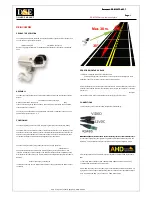
1. Turn the camera upside down, then slide the release
lock and move the film-chamber release. The film-
chamber door will unlock.
2. Open the film-chamber door and insert a
new film cassette into the film chamber.
• If the film-chamber door will not open, internal pressure
needs to be equalized. Open the battery chamber before
opening the film chamber to release the pressure.
• If the film-chamber door sticks, open it with a pen or
similar object.
3. Press the film-chamber door closed and
move the film-chamber release as shown.
• The film cassette may be damaged if the film-chamber
release is moved when the film-chamber door is open.
5. Press the shutter-release button. The film will
advance to the first frame.
• The frame counter displays the number of exposures
remaining on the roll.
• If all of the indicators in the data panel blink, the film has not
loaded. Remove and reload the film cassette.
4. Set the command switch to C, H, or P.
Use ISO 200 IX240 (Advanced Photo System) film in this camera.
• Your camera’s transport system loads the film and advances the film after each exposure.
• Do not open the film chamber unless
appears or all of the indicators blink in the data
panel.
• Install the battery before loading the film, or the film will not advance to the first frame.
• We recommend you use ISO 200 film in this camera.
Visual Exposure Indicators (VEI)
Loading Film
TAKING PICTURES
1. Set the command switch to the desired
print format.
2. Frame your subject(s) in the image
frame for the selected print format.
3. Press the shutter-release button to take the
picture.
• Keep your subject at least 1.0 m (3.3 ft.) from the camera.
• With ISO 200 film, the flash has a range of 1.0 ~ 3.0 m
(3.3 ~ 9.8 ft.) and will fire when necessary.
• Flash pictures can not be taken when
blinks in the data
panel (flash charging).
will appear in the data panel after the last exposure is taken.
When the motor stops, open the film chamber and remove the film.
• Remove your film immediately after rewinding. Film left in the camera may reload
causing double exposures.
LOADING FILM
The current VEI has a white indicator behind it.
- Unexposed
- Partially Exposed
- Exposed
- Processed
TAKING PICTURES UNDERWATER
Your camera can be used to a depth of approximately 5 m (16 ft.). Picture sharpness and
flash range are affected by water clarity. We recommend you take pictures within 2 m (6.6 ft.)
of your subject.
5m (16 ft.)
2 m (6.6 ft.)
Important – Before opening the Film Chamber
• Wipe all water, sand, and grit off of the camera.
• Make sure the film cassette is clean and dry before loading it into the camera.
• Do not load film in places where water, blowing sand, or dust can enter the camera.
• To prevent condensation from forming when bringing the camera from outdoors to
indoors, let the camera come room temperature before opening the film or battery
chambers.
Hold the camera as shown, making
sure your fingers do not cover the
flash. If you are taking a vertically
framed picture, turn the camera so
the flash is on top.
Tips for better underwater pictures…
• Color pictures taken underwater tend to appear bluish, because water
absorbs most of the red light. For best results, keep your subject within
2 m (6.6 ft.) of the camera.
• Your camera can only load unexposed film (
).






















